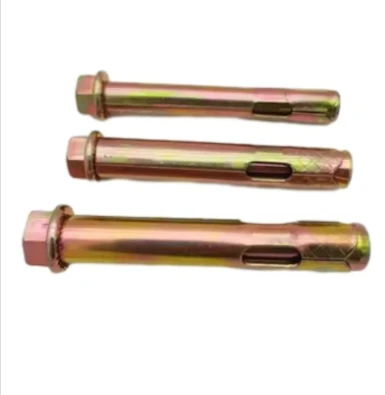जनवरी . 06, 2025 18:45 Back to list
anchor bolt
Anchor bolts are an integral part of construction and engineering, providing stability and security for various structural applications. With over two decades of experience in civil engineering and construction materials, I have witnessed firsthand the pivotal role anchor bolts play in ensuring the safety and longevity of buildings and infrastructures.

Experience dictates that choosing the right anchor bolt is crucial for any project, whether it's erecting a skyscraper or setting up a simple street sign. There are several types of anchor bolts, each designed for specific applications. The most common include cast-in-place, wedge, sleeve, and epoxy anchor bolts. Understanding their unique properties and applications can significantly enhance the durability and safety of the structure.
Cast-in-place anchor bolts are typically set into the wet concrete and provide a robust anchor due to their integration with the foundation material. In large-scale projects such as stadiums and bridges, these bolts are often the preferred choice because of their ability to withstand heavy loads and pressure.

Wedge anchors are known for their ease of installation and strong holding power. These are expansion bolts designed to provide a secure hold in solid concrete, making them ideal for heavy-duty applications such as securing machinery or large support beams.
For scenarios where installation flexibility is key, sleeve anchor bolts serve as the go-to option. These are versatile and can be used in concrete, brick, or block materials, providing a reliable solution for medium-weight applications.
Epoxy anchor bolts have risen in popularity due to their exceptional load-bearing capabilities and adaptability. These anchors use chemical adhesive which is injected into the drilled hole, offering an effective solution for securing heavy loads in porous or lightweight base materials.
anchor bolt
Expertise in the field suggests that the proper installation of anchor bolts is as important as selecting the right type. A meticulous installation process ensures that the full potential of the anchor bolt is realized. This involves precise drilling, correct torque application, and adherence to manufacturer guidelines, which are critical for achieving maximum performance and safety standards.
Anchor bolts must also meet certain industry standards and certifications to guarantee their effectiveness and reliability. American Society for Testing and Materials (ASTM) and the International Organization for Standardization (ISO) provide clear guidelines on the quality and safety of these essential components.
The authoritative voice in the construction industry emphasizes regular inspection and maintenance of anchor bolts, particularly in structures prone to dynamic loads or environmental stressors like wind or seismic activity. Over time, corrosion or fatigue can compromise the integrity of anchor bolts, necessitating timely intervention to replace or reinforce these vital components to prevent structural failures.
Trustworthiness in delivering construction solutions is earned by prioritizing quality and adhering to best practices. Collaborating with reputable manufacturers who adhere to stringent testing and quality assurance processes provides peace of mind that the anchor bolts will perform as intended.
In conclusion, the importance of anchor bolts in construction cannot be overstated. They form the backbone of structural integrity, supporting everything from simple installations to complex engineering feats. Leveraging experience, upholding expertise, maintaining authoritativeness, and fostering trustworthiness are key factors in optimizing the use of anchor bolts to ensure safety, security, and sustainability in construction projects.


